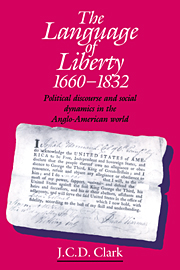 The Language of Liberty 1660–1832
The Language of Liberty 1660–1832 Published online by Cambridge University Press: 29 December 2009
THE AMERICAN REVOLUTION AS A CIVIL WAR
The passionate commitments on both sides of the Atlantic which made armed conflict unavoidable, and the loyalties in America and Britain which the conflict promoted, obscured in retrospect an important truth: in functional terms, the American Revolution shared most of the characteristics of a civil war. One such characteristic was the way in which both sides seemed to appeal to a common tradition. In 1774 a loyalist addressed the Congress: ‘You may still profess yourselves to be his Majesty's most dutiful and loyal subjects, as you did in your late RESOLVES, and as the leaders in the grand rebellion of 1641 did, in their messages to the King immediately after the battle of Edge Hill, where they had fought against him in person’; but this would not save America from the ‘desolation and slaughter’ of a civil war. Between Washington's assuming command of the Continental Army in July 1775 and the Declaration of Independence on 4 July 1776, he and his officers professed their continuing allegiance to George III in a way which indeed recalled the rhetoric of Parliamentary forces in the 1640s.
For similar reasons many English officers refused to accept a command in America, like General Lord Frederick Cavendish and Admiral Keppel, or spoke against the war in Parliament, like General Henry Seymour Conway; few of those in the field had much stomach for the conflict.
To save this book to your Kindle, first ensure no-reply@cambridge.org is added to your Approved Personal Document E-mail List under your Personal Document Settings on the Manage Your Content and Devices page of your Amazon account. Then enter the ‘name’ part of your Kindle email address below. Find out more about saving to your Kindle.
Note you can select to save to either the @free.kindle.com or @kindle.com variations. ‘@free.kindle.com’ emails are free but can only be saved to your device when it is connected to wi-fi. ‘@kindle.com’ emails can be delivered even when you are not connected to wi-fi, but note that service fees apply.
Find out more about the Kindle Personal Document Service.
To save content items to your account, please confirm that you agree to abide by our usage policies. If this is the first time you use this feature, you will be asked to authorise Cambridge Core to connect with your account. Find out more about saving content to Dropbox.
To save content items to your account, please confirm that you agree to abide by our usage policies. If this is the first time you use this feature, you will be asked to authorise Cambridge Core to connect with your account. Find out more about saving content to Google Drive.